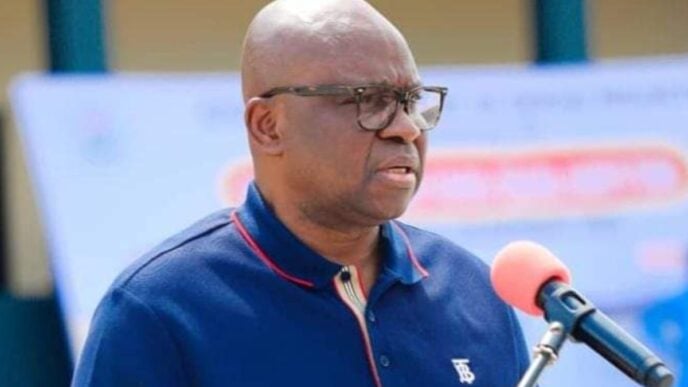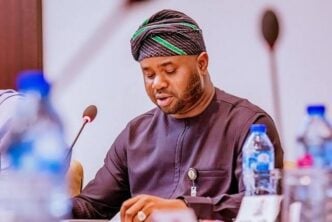Governors of Akwa Ibom and Cross River
It has been 26 years since the legal battle over the ownership of some 76 offshore oils wells arose between Cross River and Akwa Ibom; and despite the fact that the supreme court has adjudicated and passed judgments in favour of Akwa Ibom, tensions have arisen once again between the two states.
In recent public statements, some citizens and officials of Cross River state government have claimed that the matter is up for a review and that Akwa Ibom will have to forfeit the oil wells to them. They have also falsely claimed that Akwa Ibom has not been receiving derivation payments on the 76 oil wells because such payments have been warehoused in an escrow account awaiting to be either shared between the two states or given only to Cross River. Akwa Ibom officials have repudiated these claims to seek political solution and dialogue.
It would seem that some Cross River officials have not yet come to terms with the judgment of the International Court of Justice at The Hague that the state is no longer a littoral state after the ceding of Bakassi to Cameroon. The loss of Bakassi and its littoral state status imply that Cross River cannot possibly claim ownership of offshore oil assets.
The supreme court has affirmed this fact in two landmark judgments, but instead of accepting it, Cross River officials have recently resorted to making false and incendiary claims that are capable causing crisis between the two states. It is important that Akwa Ibom commissioner for justice and attorney-general, Uko Udom, SAN, has issued a comprehensive statement, laying out the government’s position and repudiating the unfounded messages that have been circulating in the social media.
Advertisement
The whole problem started in 1999 when Cross River government under Governor Donald Duke sued Akwa Ibom in Suit No. 124/1999 over the northern non-estuarine boundary (involving 24 villages of Oku/Itu/Ayadehe Ward in Itu local government area of Akwa Ibom state), as well as the southern estuarine boundary where the 76 oil wells are located.
On June 24, 2005, the supreme court ruled in favour of Cross River only on the matter of the 24 villages in the north. It, however, dismissed their claim over the estuarine southern territory, where the oil wells are situated. In its landmark ruling, the supreme court declared: “In considering the merit of the plaintiff’s case, it is important to bear in mind that the effect of the judgment of ICJ dated 10/10/2002 on the land and maritime boundary case between Nigeria and Cameroon is that it has wiped off what used to be the estuarine sector of Cross River State… Cross River no longer has a seaward boundary.”
Before Cross River instituted the second case marked Suit No. SC. 27/2010, Akwa Ibom made several conciliatory efforts to resolve the issue amicably. These included a proposed ₦250 million ex gratia monthly payment to Cross River state from Akwa Ibom’s derivation revenue, a gesture misunderstood and ultimately rejected. Cross River even wrote a letter dated March 27, 2006, formally turning down the N250 million monthly payment. Who does that?
Advertisement
Undeterred, Akwa Ibom went further to engage elder statesmen and other important citizens and stakeholders to discourage litigation, emphasising the bond of kinship between the two states, and the potential for long-term damage to inter-state harmony. Unfortunately, these peace overtures were rebuffed.
But despite Akwa Ibom’s posture of restraint and goodwill, Cross River State government initiated fresh legal action seeking judicial clarification on ownership and revenue entitlements over the 76 oil wells, which are situated within the 200-meter isobath and contiguous to Akwa Ibom. After nearly three years of litigation, the supreme court on July 10, 2012 again ruled decisively in favour of Akwa Ibom.
The court stated, per Adekeye, JSC: “The facts before the court do not support the claim of the plaintiff to being a littoral state. A non-littoral state cannot claim oil wells offshore, as it has no maritime boundary.” Rhodes-Vivour, JSC (as he then was) also pronounced: “The plaintiff’s case crumbles due to the wrong assumption that it is a littoral state… That reasoning is strange and unfortunate. It is wrong.”
This judgment reaffirmed the principle of derivation as provided under Section 162(2) of the 1999 Constitution (as amended) and Section 1(1) of the Allocation of Revenue (Abolition of Dichotomy in the Application of the Principle of Derivation) Act, 2004. As I mentioned earlier, a critical legal and geographical fact underpinning this matter is the 2002 International Court of Justice (ICJ) judgment ceding the Bakassi Peninsula to Cameroon. This effectively stripped Cross River of littoral status and rendered it ineligible to claim offshore oil assets—a fact confirmed by the supreme court.
Advertisement
In a recent meeting convened by Vice-President Kashim Shettima, both Gov Umo Eno of Akwa Ibom and Bassey Otu of Cross River were encouraged to meet and amicably recommend a political solution. As chairman of the South-South Progressive Governors’ Forum, Otu was expected to initiate this engagement by inviting Eno to settlement talks.
But this has not happened. Rather, Cross River officials have been making public statements that do not conduce to amicable coexistence of the peoples of the two states. Several officials of the Cross River government have made incendiary and patently false claims that have agitated the people of Akwa Ibom and introduced an unwarranted sense of apprehension. Agitated, I have personally spoken to Governor Eno up to three times on this matter; and two weeks ago, during a stakeholders’ meeting, the governor assured Akwa Ibom people that the matter was under control.
The peoples of the two states, especially the Efik people of Cross River and Akwa Ibom people are too interrelated to fight. My younger brother is married to an Efik woman. Gov. Otu himself is Efik. I am therefore pleased to note from my conversations with Akwa Ibom officials that the state is open to a political solution, ‘’provided such does not seek to deny our people their lawful and judicially-affirmed rights’’, as Attorney-General Uko Udom put it.
However, political solution cannot be limited to the matter of the 76 oil wells. It must also address the Akwa Ibom communities added to Cross River. These were the two issues considered by the supreme court in determining the land and maritime boundaries between Cross River and Akwa Ibom.
Advertisement
The federal government has several policy and fiscal options for assisting Cross River to mitigate the economic consequences of the ICJ judgment. For instance, ecological funds, environmental remediation programmes, and interventions under the South-South Development Commission could be directed to address and support genuine needs without dispossessing Akwa Ibom of its legitimate entitlements.
I should also note that Akwa Ibom has also suffered a similar loss of oil wells. It lost 86 oil wells to Rivers State in Suit No: SC.27/2010 (Rivers State v. Akwa Ibom State) decided by the supreme court on March 18, 2011. Akwa Ibom accepted the supreme court’s verdict in good faith and has remained committed to due process and peaceful coexistence. Cross River should toe the same path and move on.
Advertisement
Views expressed by contributors are strictly personal and not of TheCable.











